If Atlantis really existed, it’s time frame was probably between 9,000 BC and it’s destruction by flooding in about 5,550 BC, and the length of existence is unknown, but probably at least one thousand years in order to develop agriculture, the wheel, and other things like some metalurgy.
Most scholars have thought the stories are fables, myths. Perhaps since the waters nearby “Atlantis” have been called”Atlantic”, have we now miss perceived the designation Atlantic from what was meant and thus have had researchers looking in the wrong place?
The text in bold and italic are copied bits from : Critias by Plato
Translator: Benjamin Jowett
Release Date: August 15, 2008 [EBook #1571]
Last Updated: January 15, 2013
Text in black are my, George Weller’s, comments.
WORDS FROM CRITIAS
“Let me begin by observing first of all, that nine thousand was the sum of years which had elapsed since the war which was said to have taken place between those who dwelt outside the pillars of Heracles and all who dwelt within them; this war I am going to describe. Of the
combatants on the one side, the city of Athens was reported to have been the leader and to have fought out the war; the combatants on the other side were commanded by the kings of Atlantis, which, as I was saying, was an island greater in extent than Libya and Asia, and when afterwards sunk by an earthquake, became an impassable barrier of mud to voyagers sailing from hence to any part of the ocean.”
Plato wrote this about 360 BC. At 9,000 years before this was when the last Ice Age was melting pouring fresh water south into the now Black Sea. When Atlantis and Athens fought, this Black Sea was a huge fresh water lake, high enough to flow west over the Bosporus into the approximately 60 foot lower Aegean Sea.
The “pillars of Heracles” could well have been the 50 mile long mountainous sides of the Bosporus river valley when the water level was very low as the ice age fresh water flowing west out of the evaporating Black Sea lake was slowly dwindling to nothing.
According to the book NOAH’S FLOOD by Ryan and Pitman © 1998, by about 5,550 BC the Black Sea fresh water lake evaporated down about 500 feet and the world’s oceans rose. It was enough so that in 5,550 BC the world’s oceans flooded salt water from the Aegean into the Black Sea fresh water lake. At that time the 50 mile long Bosporus would have become a turmoil of mud and water. This flood raised the level of the Black Sea Lake about 500 feet. The Black Sea water level rose 300 feet to the plains of Atlantis, then continued to flood another 200 feet deep over most of the plain of Atlantis and most of its one small mountain, which was “the home of the gods”.
Poseidon, receiving for his lot the island of Atlantis, begat children by a mortal woman, and settled them in a part of the island, which I will describe.
Looking towards the sea, but in the centre of the whole island, there was a plain which is said to have been the fairest of all plains and very fertile. Near the plain again, and also in the centre of the island at a distance of about fifty stadia, there was a mountain not very high on any side.”
The top of this mountain is above water and is now called Snake island, also called Zmiinyl Island, and Serpent Island, and Leucos by Greeks and Alba by Romans because of its white marble foundations. Ref. Wikipedia article “Snake Island (Black Sea), History segment”.
“I have before remarked in speaking of the allotments of the gods, that they distributed the whole earth into portions differing in extent, and made for themselves temples and instituted sacrifices. And Poseidon,
receiving for his lot the island of Atlantis.
Poseidon is the god of water. It seems appropriate that if Atlantis is put under water, it would be his jurisdiction and his action.
“Poseidon fell in love with her and had intercourse with her, and breaking the ground, inclosed the hill in which she dwelt…no man could get to the island, for ships and voyages were not as yet.
He also begat and brought up five pairs of twin male children; and dividing the island of Atlantis into ten portions, he gave to the first-born of the eldest pair his mother’s dwelling and the surrounding allotment, which was the largest and best, and made him king over the
rest; the others he made princes, and gave them rule over many men, and a large territory. And he named them all; the eldest, who was the first king, he named Atlas, and after him the whole island and the ocean were called Atlantic.”
So the large body of waters, oceans, were called Atlantic. Could the huge Black Sea and the Aegean, and more etc. be called Atlantic at that time too? Wikipedia says”The name derives from Greek Mythology, where it means the “Sea of Atlas.” It does not define how large or where.
“To his twin brother, who was born after him, and obtained as his lot the extremity of the island towards the pillars of Heracles, facing the country which is now called the region of Gades in that part of the world…”
Could this pillars of Heracles actually be the now Bosporus when it was a big long valley with little water? The Bosporus is at the narrowing south end of my concept of the Atlantis region. Atlantis would be east of the Bosporus and the region of Greeks and of humanity would be west of the Pillars of Heracles, currently the Bosporus,
“All these and their descendants for many generations were the inhabitants and rulers of divers islands in the open sea; and also, as has been already said, they held sway in our direction over the country within the pillars as far as Egypt and Tyrrhenia.”
So it seems that islands in the eastern Mediterranean, west of the “pillars of Heracles” (the Bosporus) were ruled by descendants of Poseidon and controlled by rulers of Atlantis. Tyrrhenia refers to a non-Greek people.
“And at the very beginning they built the palace in the habitation of the god and of their ancestors, which they continued to ornament in successive generations, every king surpassing the one who went before him to the utmost of his power, until they made the building a marvel to behold for size and for beauty.”
Could there be any ruins left around this one mountain, now a very small island off the delta of the Danube river entering the Black Sea?
There are temple remains of various gods on the mountain, now island top. The lighthouse is built on the previously destroyed temple of Achilles. The remnants of a Greek temple dedicated to Achilles, 30 meters on a side, were found in 1823 by the Russian naval captain N.D. Kritzkii. Several temples of Apollo can be found here and there are other submerged ruins.
From: Wikipedia.org/wiki/Snake Island…
The land area of Atlantis described by Critias is as follows.
“I have described the city and the environs of the ancient palace nearly in the words of Solon, and now I must endeavour to represent to you the nature and arrangement of the rest of the land. The whole country was said by him to be very lofty and precipitous on the side of the sea, but the country immediately about and surrounding the city was a level plain, itself surrounded by mountains which descended towards the sea;
it was smooth and even, and of an oblong shape, extending in one direction three thousand stadia, but across the centre inland it was two thousand stadia. This part of the island looked towards the south, and was sheltered from the north. The surrounding mountains were celebrated for their number and size and beauty, far beyond any which still exist, having in them also many wealthy villages of country folk, and rivers, and lakes, and meadows supplying food enough for every animal, wild or tame, and much wood of various sorts, abundant for each and every kind of work.
While the Black Sea then as a fresh water lake was still evaporating, the plain would be “very lofty” and the eastern shelf edge would be “precipitous on the side of the sea”. There are very dramatic mountains to 8,000 feet high in a “u” shape surrounding the flat plain around Bucharest in Romania and Bulgaria.
Two thousand stadia is about 237 miles.
Three thousand stadia is about 355 miles.
“I will now describe the plain, as it was fashioned by nature and by the labours of many generations of kings through long ages. It was for the most part rectangular and oblong, and where falling out of the straight line followed the circular ditch. The depth, and width, and length of this ditch were incredible, and gave the impression that a work of such extent, in addition to so many others, could never have been artificial.
Nevertheless I must say what I was told. It was excavated to the depth of a hundred feet, and its breadth was a stadium everywhere; it was carried round the whole of the plain, and was ten thousand stadia in length. It received the streams which came down from the mountains, and
winding round the plain and meeting at the city, was there let off into the sea. Further inland, likewise, straight canals of a hundred feet in width were cut from it through the plain, and again let off into the ditch leading to the sea: these canals were at intervals of a hundred stadia, and by them they brought down the wood from the mountains to the city, and conveyed the fruits of the earth in ships, cutting transverse passages from one canal into another, and to the city.”
Ten thousand stadia is about an incredible 1,184 miles. But that is approximately the circumference of the shallow underwater shelf on the north east side of the current Black Sea which is about 1,191 miles. It would assume there was a “ditch” made by the Danube and other rivers flowing around the western edge of the plain of Atlantis, ie, the shallow underwater shelf as it is now under the now Black Sea, going to the “sea”.
“As to the population, each of the lots in the plain had to find a leader for the men who were fit for military service, and size of a lot was a square of ten stadia each way, and the total number of all the lots was sixty thousand.”
If a Greek stadia is 625 feet, then 10 stadia is 6,250 feet.
A square of 10 stadia would then be about 1.4 square miles.
60,000 lots would be about 84,070 square miles.
The shelf is about 31,240 square miles.
If you include the flattish part of Bulgaria under 150 feet in elevation and the shelf area, one can get 84,076 square miles.
“Zeus, the god of gods, who rules according to law, and is able to see into such things, perceiving that an honourable race was in a woeful plight, and wanting to inflict punishment on them, that they might be chastened and improve, collected all the gods into their most holy
habitation, which, being placed in the centre of the world, beholds all created things. And when he had called them together, he spake as follows[*there the Critias story ends unfinished]”
Was the the flooding that actually happened in 5,550 BC, the word of “God”, the word of Zeus the head god? Was the Black fresh water Sea next to the people of the land of Atlantis, named “Atlantic” by the people of Atlantis, and the water we now call the mostly salt water Black Sea?? I think the people from Atlantis, ie. people from Atlas, first son of Poseidon, son of Zeus, not only called the Black Sea area Atlantic, but also the Adriatic, Mediterranean and any other huge “ocean type” body of water. The waters would be called the sea of Atlas. This would be true as Poseidon’s other sons also controlled the islands of the eastern Mediterranean west of the Pillars of Heracles, Bosporus straight as we now know it.
Perhaps this concept deserves more archeological research.
The next segment has maps of the possible areas involved in the Critias description.
Map showing Black Sea area from Google Earth.
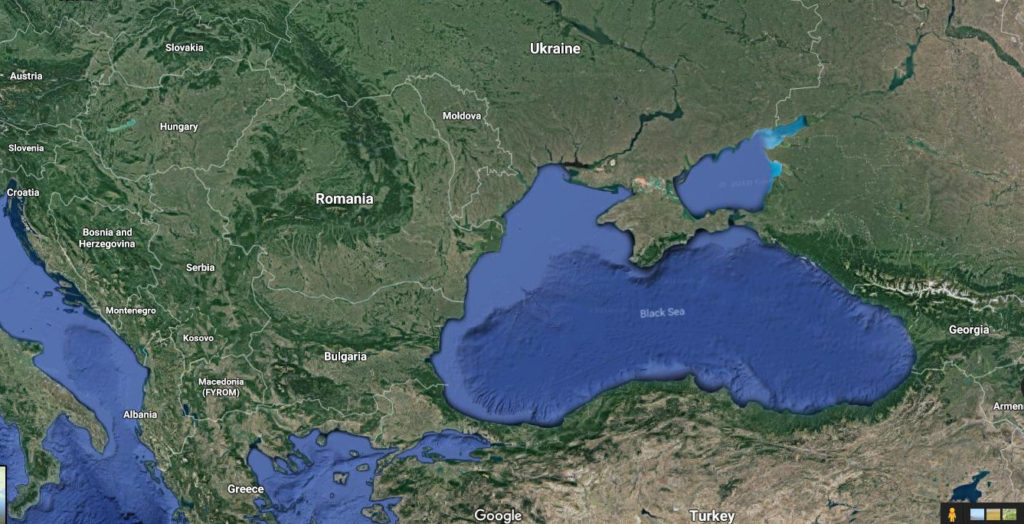
The Bosporus passage is nearly invisible in the bit of land to the bottom left of the Black Sea.
Notice the light blue shaded area to the northwest of the Black Sea. It is much shallower in water depth mostly below 200 feet deep, a huge nearly flat underwater shelf roughly about 100 miles wide and nearly 350 miles long. The perimeter of the shelf is over 1,000 miles.
Map showing shallow shelf which could be part of the plains of Atlantis.
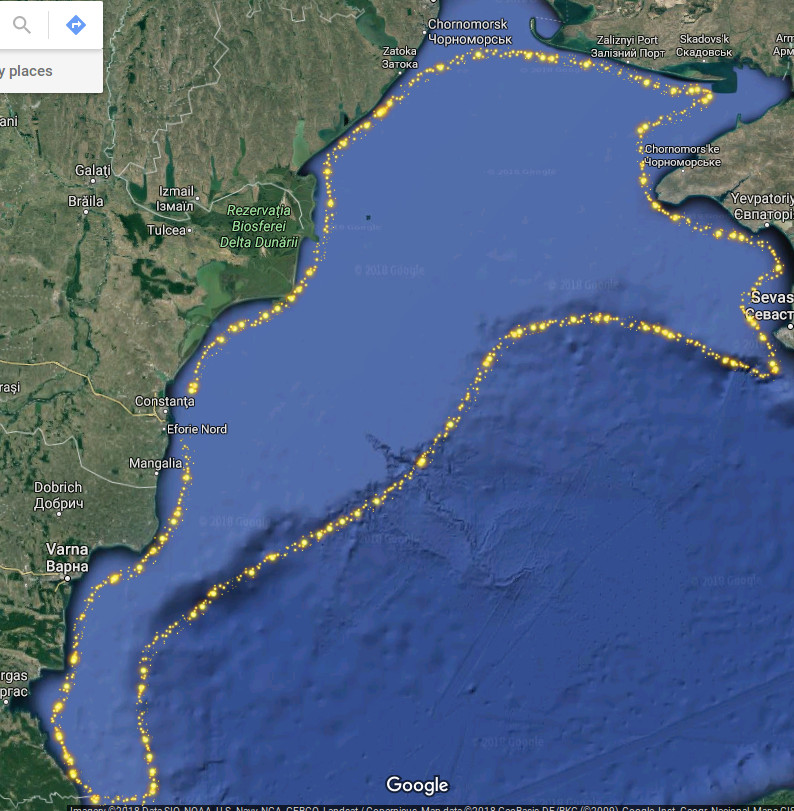
If you look hard you will see a small black dot just east of the Danube river delta where the Danube enters the Black Sea. It is the very small island (Zmiinyl) remaining of the submerged mountain. Can it be the remains of the “not very high” mountain where Poseidon mated with a mortal woman, had child Atlas, and became a sacred mountain? Greek deity temple remains have been found here.
Map showing proposed outline of Atlantis- all land less than 400 feet above eastern edge of shelf.
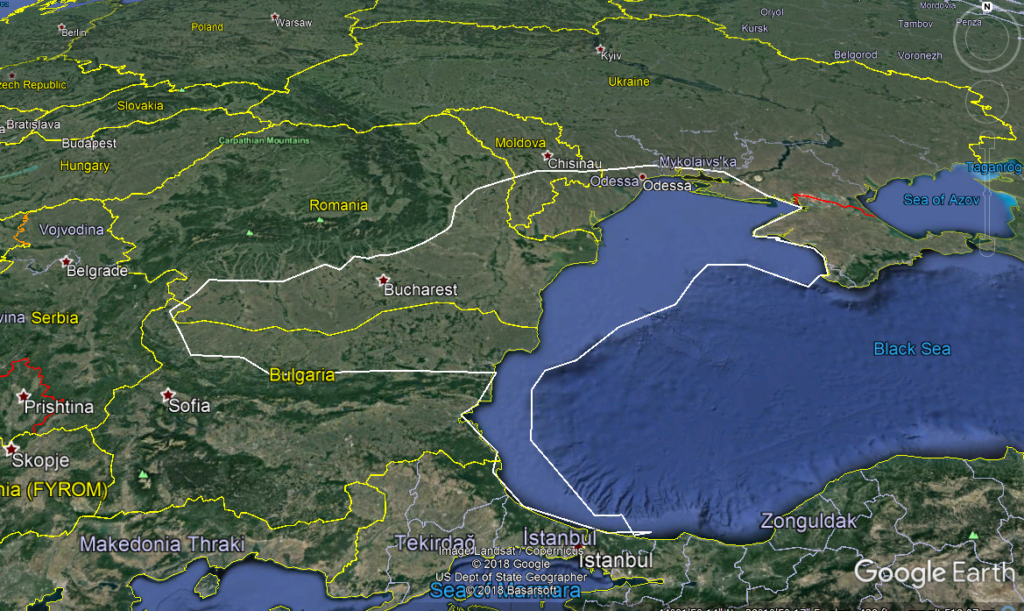
Notice the mountains (darker green) circling the western, left, side of the enclosed white line. These ”mountains were celebrated for their number and size and beauty, far beyond any which still exist”.
Map filled in with white showing proposed Atlantis including shelf and low lying areas of Bulgaria and Romania. This area is approximately the size indicated for Atlantis in the Critias.
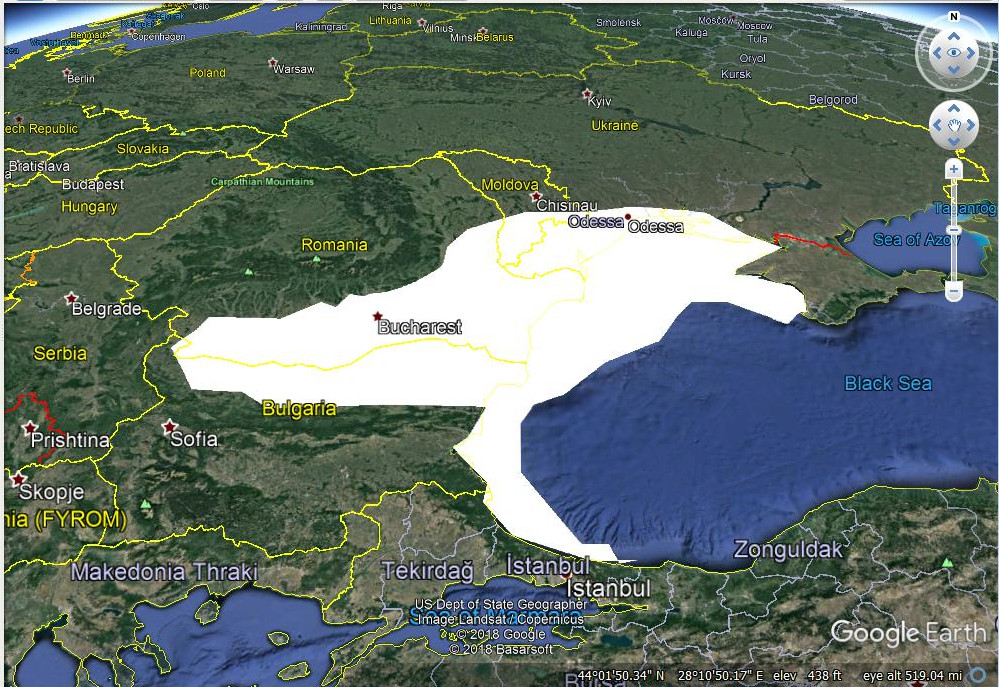
Notice distances of lines drawn below distances mentioned in Critias.
the country immediately about and surrounding the city was a level plain, itself surrounded by mountains which descended towards the sea; it was smooth and even, and of an oblong shape, extending in one direction three thousand stadia, but across the centre inland it was two
thousand stadia.
Three thousand stadia is about 355 miles.
Two thousand stadia is about 237 miles across.
It is really hard to believe this proposed Atlantis has an E-W distance on Google Earth of 234 miles and Critias states two thousand stadia is about 237 miles across
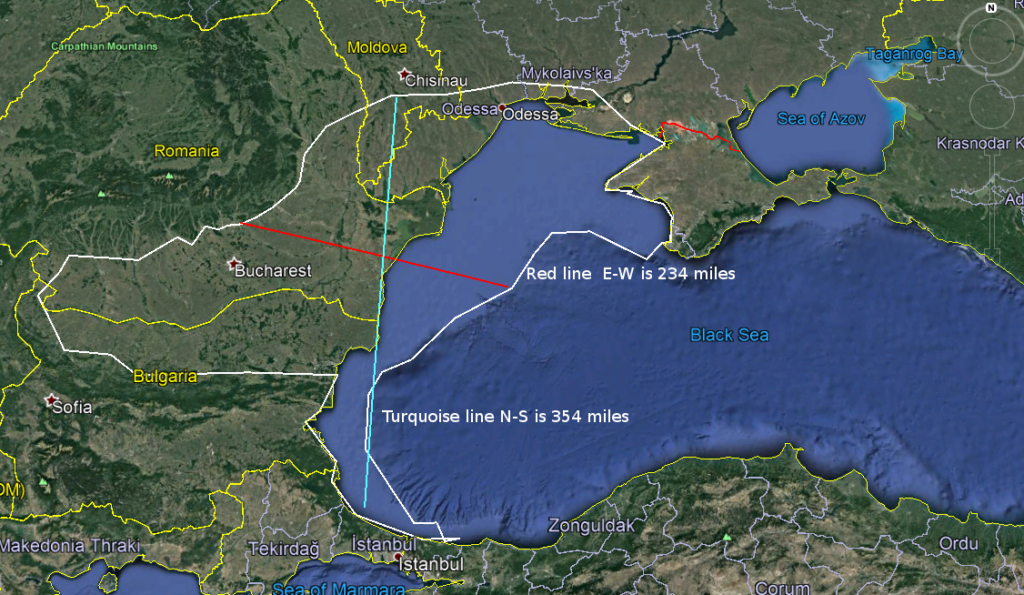
And the N-S map distance is 354 miles where Critias says three thousand stadia or 355 miles.
The lines drawn are approximate, but representative.
© George K. Weller Oct 2018
